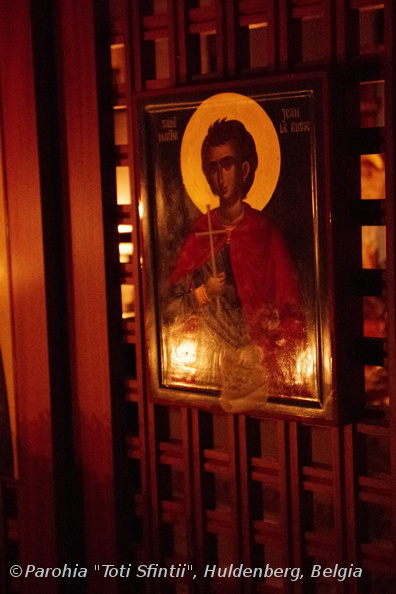On the feast of St. John the Russian (+27 May), our protector
Starting from what we know from the life of Saint John the Russian and the special relationship our parish has with him, I would like to share with you a few thoughts about St. John.
1. First, I would like to recall Saint John’s gift to us, those who gather here [at the church in Namur], for all our services. Every year, on May 27th, we celebrate Saint John as one of our great protectors, as the one who, as it became obvious for us, granted us this place. And what he did for us is no small thing!

For those who do not know, I would like to recall the fact that, when we started to look for a church for our parish (around 2010), we took Saint John the Russian, Saint Nektarios, Saint Ephraim the Newly Revealed, and Saint Nicholas as companions in our search. And we prayed to them to help us find a church we could buy.
At some point, in January 2011, we found out that a former Catholic monastery – the one in whose church we serve today – would be for sale. We all started to pray to our dear saints. My heart was leaning towards Saint John the Russian, whom I asked for help in order to buy that property, if God was willing, while promising him that at least one of the feasts of the church would be dedicated to him. Moreover, with a boldness bordering on insolence (a boldness which I would not have today), I asked him to convince me that this place was his gift, by arranging everything in such a way so that the first vigil held in this church be on his feast day, May 27th. Everything happened around January that year. Humanly speaking, this seemed impossible, but I kept remembering the encouragement of Father Rafail Noica, to ask for God’s help especially in those things that seem impossible.
Indeed, everything was arranged in such a way that on May 23rd we received the keys of the church. We also had time to clean the place, to build an Altar to our Lord and tidy the surroundings. And Saint John the Russian decided to give us another gift: on May 26th, he gave our bishops the idea to hold their annual meeting in Brussels. In this way, we were able to invite them on the evening of May 26th, to sanctify this place and bless our beginning. Afterwards, we remained there and continued our first night vigil in this church, dedicated to Saint John the Russian, thus serving our first Saint Liturgy.


I have thus understood that, in a very obvious way, Saint John the Russian helped us with both the documents, as well as raising the money necessary. He did what he did and did not let us down, and gave us this church. Now, it is our turn not to let Saint John down J, to “harass” him with our prayers to always take care of us. This is what the saints want, what the Most Holy Mother of God wants: to constantly ask for their help. In this way, our ties with them will become stronger and stronger, our mind will be seized more and more with the heavenly things, and we will develop the reflex that, both in peacetime and in wartime, we raise our mind to Christ and His saints.
2. We have also learned another very important thing from this concrete help from Saint John. At the beginning, the thought of buying the former Catholic monastery was met with mistrust and disapproval by almost all the people I knew: - my superiors and my colleagues - the asking sum was large, and I could only count on the financial support of a handful of close people (I had only about 30-40 spiritual children at that moment). However, to all the ironies and “negative encouragements” of those who did not believe that we could ever be able to buy this place, I responded with a story about Gheronda Joseph: one day, an acquaintance of his passed by the courtyard of his cell, where Gheronda was with a couple of his spiritual sons. That acquaintance chaffed a little bit at him, asking him: “These are your disciples, Joseph?”. But Gheronda peacefully replied: “Yes, indeed, they are. But as poor as they look to you, in a few years, they will change the face of the Holy Mountain!”. I was smiling as I was making this comparison, but what I meant to say was that for God, the thought always precedes the deed, the accomplishment (see Genesis). If a thought is well-pleasing to God, He will provide the right means and the right people to accomplish it. And this was proven right, because, by the prayers and enthusiasm of a small number of my spiritual children, such a state of spirit emerged that it rapidly spread beyond the borders of Belgium, touching many hearts, that then transformed into concrete help in the founding of this monastery and of our parish.
3. Through his life, Saint John gives us an extremely important lesson about freedom. In the Church, we have learned that, in order for one’s life to be meaningful, man has to learn to live freely. The experience of Saint John (and of the saints from the communist prisons), shows us that true liberty is the one of the Spirit, the freedom of a man who is not a slave of any inner determination (that is, of any passion). Because from the outside, he lived as a slave to a pagan throughout the years during which he sanctified his life. In a certain way, we also live through what Saint John had to experience, in a world where our external freedoms are limited, even to the point of their nullification; we are led by people without God, who impose on us the way we should think and act, who mock at and persecute our faith. Saint John’s greatest concern was to continuously pray to God to grant him grace in order to struggle to cleanse himself of passions, and to endure all the troubles and mockery from those around him.
4. Saint John’s solution is essential, for he shows us another way of witnessing to Christ apart from the bleeding of martyrdom – that of remaining a Christian in all our daily choices and attitudes, both internal and external, and of receiving everything as coming from the hand of God, by His tolerance. What a battle against thoughts he must have had – as he was a man like us! Maybe not necessarily against his Turkish masters, but certainly the enemy suggested him thoughts such as “When will the Lord save me from this slavery?”, “Why did I have to be taken prisoner?”, “Why did this happen to me?”, “How long do I have to stay in this filth, in this stable, where is God’s righteousness? I am faithful, I pray, I fast, I go to church, and these unfaithful and unbearable Turks make a mock of myself instead of God punishing them”, and so on and so forth.
5. Afterwards, when the Muslim masters became milder, understanding that the blessing and abundance bestowed on their families had come through their slave John, they offered him the option to move out from the stable he had been living with the animals into a more honourable room. However, Saint John withstood three major temptations:
- the temptation of pride (he could have said to himself : “at last, they realised that their living has improved by my prayers ; I deserve their reward");
- the temptation of the psychological consolation (he refused to accept the joy of the human reward of his Turkish master, while preferring to remain in the stable until his death, thus entering the joy of his Lord – see Mathew 25:21);
- the temptation of a comfortable life (a great temptation for the Orthodox Christian, but especially for us in the diaspora, one we face every time we anchor ourselves on earth and not in heaven, sacrificing even our children on the altar of our own comfort and ease);
This is the attitude we should follow as well, the people of ‘today’, we who are so tormented by thoughts, attacks and challenges from within and outside the Church. We should fight with our thoughts, we should offer repentance and we should struggle to be cleansed of our passions and to remain in obedience to the Church. We should fighting to not sin, to not judge, and to become part of a community where we have a spiritual father and where we strive to become one with the others, according to the commandment of our Lord.
6. Saint John can also be of great help to those who, due to various circumstances, cannot be part of an authentic parish or of a certain community, and are tempted to give up the fight, to give up prayer for himself and for the world. Nothing is lost with God – not a single whisper, not a single tear, not a single labour for the benefit of the Church – nothing is in vain. For our Saint, his model was Christ and his saints, who toiled the land of the Church without waiting for confirmations, consolation or human gratitude. We see this in the life of Christ, we read about it in the epistles of the Saint Apostle Paul: he, who could have given his life for the others, was betrayed and disappointed by people so many times, but he never abandoned the struggle of proclaiming Christ to the world. And we can see in Saint Silouan as well; he who, for instance, after many hours of service and work, strived to write a few thoughts every day about God’s love, having one single desire: that at least one soul might benefit from reading them. And for all this, God, not people, has glorified him.
This is how Saint John lived and this is how we ought to live, driven by this thought: “I do this for Christ! Neither for you, nor for them or for myself for that matter; but for Christ!”. And everything will be easier.
Fr. Ciprian
